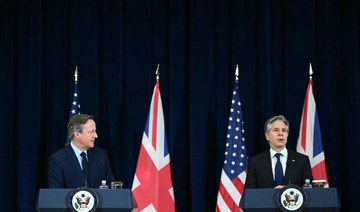MUMBAI: India’s top court on Thursday began examining whether it was legal for a Muslim man to dump his wife by saying “I divorce you” three times, raising hopes among women campaigners of a long-awaited end to the ‘quickie’ divorce.
The practice of “triple talaq” is banned in most Muslim countries but allowed under India’s constitution that lets most religions, including Muslims — the biggest religious minority — regulate matters like marriage and divorce through civil codes.
But the Islamic instant divorce has come under increasing criticism as unconstitutional by violating the right to equality. Reports have emerged of men divorcing their wives via Skype, WhatsApp and text message, leaving families destitute.
Muslim women in India have demanded a ban to triple talaq with several women petitioning the nation’s top court, the Supreme Court, to overturn the practice.
Conservative Muslim clerics staunchly oppose any change.
At the hearing on Thursday, five multi-faith judges of the Supreme Court started to determine whether triple talaq is part of a fundamental religious right for Muslims.
“If we come to a conclusion that triple talaq is part of (the) fundamental right to religion, we would not interfere,” the judges were quoted as saying by The Times of India.
Local media said the Supreme Court has set aside six days for the hearing — half for those challenging triple talaq and half in defense — with the hearing expected to end by May 19.
The national Law Commission last year sought public views on whether to abolish the practice, triggering a debate between politicians and religious leaders.
More than 90 percent of Muslim women surveyed in 2015 by Bharatiya Muslim Mahila Andolan (BMMA), which campaigns for women’s rights, wanted an end to triple talaq and polygamy.
Noor Jehan from BMMA said they wanted the Supreme Court to rule triple talaq was illegal and unconstitutional, with many women left without support after such a divorce.
“Thousands of Muslim women have been suffering for long and they will welcome it if the court ends this practice of unilateral divorce,” she told the Thomson Reuters Foundation
The All India Muslim Personal Law Board (AIMPLB), a non-governmental body which oversees the application of Muslim personal law, opposes any ban on triple talaq and argues this is a religious matter and not for the courts.
But Prime Minister Narendra Modi disagrees and last year waded into a controversy by saying he believed it was destroying women’s lives, with Muslims making up about 13 percent of the country’s 1.2 billion people.
“It is the responsibility of the government and people of the country to give justice to Muslim women,” Modi said at a rally in Mahoba last year.
India’s top court reviews Muslim women's petition to ban instant 'triple talaq' divorce
India’s top court reviews Muslim women's petition to ban instant 'triple talaq' divorce

Black, Asian and minority ethnic people make up nearly 70% of UK’s anti-terror detentions, data shows

- Fewer than 1 in 5 who were stopped were recorded as white
LONDON: Nearly 70 percent of people stopped at UK ports under anti-terrorism laws since 2021 were from Black, Asian and minority ethnic backgrounds, new figures released on Sunday show.
The Guardian newspaper requested police data under freedom of information laws, which also revealed fewer than one in five who were stopped were recorded as white.
Campaigners have criticized the statistics, saying they prove the UK’s anti-terrorism laws are disproportionately affecting Black and minority ethnic groups and not being used effectively enough to arrest the rise of far-right, white extremism, The Guardian reported.
Of the 8,095 people stopped at UK ports since 2021 under Schedule 7 of the Terrorism Act 2000, 5,619 (69.4 percent) were recorded as being from Black, Asian and minority ethnic backgrounds, compared with 1,585 (19.6 percent) recorded as white British, white Irish or white other stopped under the same law.
The head of public advocacy at the anti-Islamophobia group Cage International has also pressed British police to publish data on the religious background of those stopped under the Terrorism Act.
Anas Mustapha said: “This new data reaffirms what we already know about its racist and Islamophobic impact. However, despite evidence demonstrating that the majority of those stopped are Muslim and that forces record data on religion, the government has resisted calls to produce a religious breakdown of those harassed at the borders.
“Schedule 7 is one of the most intrusive and discriminatory of all police powers. We’ve supported hundreds of British holidaymakers impacted by the policy and it’s clear that the power is abused and must be repealed.”
A spokesman from the UK’s counter-terrorism police said the law was a “vital tool” in collecting evidence to support convictions of terrorists, as well as helping with intelligence-gathering in the prevention of attacks on British streets.
“The use of Schedule 7 powers regularly features in some of our most complex and high-risk investigations and prosecutions,” the spokesman said.
“We face an enduring terrorist threat from overseas, and whilst we are seeing a much greater prevalence of online activity, travel remains an element of terrorist methodology that provides us with potentially crucial opportunities to act.
“Where the powers are used, there are a range of robust safeguards and measures in place to ensure appropriate usage.”
OIC calls for immediate aid amid Afghan flood crisis

- Flash floods from seasonal rains in Baghlan province in northern Afghanistan
RIYADH: The Organization of Islamic Cooperation has issued an urgent appeal to its member states as well as relief organizations to provide aid to the Afghan people amid catastrophic flooding which has hit the country, Saudi Press Agency reported on Sunday.
Flash floods from seasonal rains in Baghlan province in northern Afghanistan killed at least 315 people since striking on Friday, a UN report said.
Rains also caused heavy damage in northeastern Badakhshan province and central Ghor province, officials said.
Since mid-April, floods have left about 100 people dead in 10 of Afghanistan’s provinces, with no region entirely spared, according to authorities.
Farmland has been swamped in a country where 80 percent of the more than 40 million people depend on agriculture to survive.
UK investigating Hamas’ claim that British hostage killed in Gaza

- Foreign secretary confirms viewing video
LONDON: The UK’s Foreign Office said on Sunday it was investigating a claim by Hamas that a British-Israeli hostage in Gaza had died from injuries sustained in an Israeli airstrike over a month ago.
Nadav Popplewell, 51, was captured along with his mother Channah Peri on Oct. 7 during a border incursion when the Palestinian group launched a surprise attack on Israel.
The Foreign Office said it was actively seeking more information on the matter.
Popplewell’s family has requested media outlets refrain from airing footage released by Hamas, showing him in captivity with visible injuries, the BBC reported.
The UK’s Foreign Secretary David Cameron, speaking to the BBC’s Laura Kuenssberg, confirmed viewing the video but provided no further updates on the investigation.
Cameron said: “We don’t want to say anything until we have better information.”
He described Hamas as “callous” for releasing the video and playing “with the family’s emotions in that way.”
The Foreign Office added that the department’s thoughts “are with his family at this extremely distressing time.”
The Israeli military has not issued a statement on the matter.
Israel’s military campaign in Gaza to destroy Hamas has killed over 34,900 people, the majority of whom are women and children, according to the Gaza Health Ministry.
Israel has reported that 128 hostages are unaccounted for.
UK mountaineer logs most Everest climbs by a foreigner, Nepali makes 29th ascent

- Both climbers used Southeast Ridge route to summit
- They were on separate expeditions guiding their clients
KATMANDU: A British climber and a Nepali guide have broken their own records for most climbs of Mount Everest, the world’s highest mountain, hiking officials said on Sunday.
Rakesh Gurung, director of Nepal’s Department of Tourism, said Britain’s Kenton Cool, 50, and Nepali guide Kami Rita Sherpa, 54, climbed the 8,849-meter (29,032 foot) peak for the 18th and 29th time, respectively.
They were on separate expeditions guiding their clients.
“He just keeps going and going... amazing guy!” Garrett Madison of the US-based expedition organizing company Madison Mountaineering said of the Nepali climber. Madison had teamed up with Kami Rita to climb the summits of Everest, Lhotse, and K2 in 2014.
K2, located in Pakistan, is the world’s second-highest mountain and Lhotse in Nepal is the fourth-tallest.
Lukas Furtenbach of the Austrian expedition operator Furtenbach Adventures called Cool’s feat remarkable.
“He is a fundamental part of the Everest guiding industry. Kenton Cool is an institution,” Furtenbach, who is leading an expedition from the Chinese side of Everest, told Reuters.
Both climbers used the Southeast Ridge route to the summit.
Pioneered by the first summiteers, New Zealander Sir Edmund Hillary and Sherpa Tenzing Norgay in 1953, the route remains the most popular path to the Everest summit.
Kami Rita first climbed Everest in 1994 and has done so almost every year since, except for three years when authorities closed the mountain for various reasons.
He climbed the mountain twice last year.
Mountain climbing is a major tourism activity and a source of income as well as employment for Nepal, home to eight of the world’s 14 tallest peaks, including Everest.
Nepal has issued 414 permits, each costing $11,000 to climbers for the climbing season that ends this month.
Banning UK arms exports to Israel would strengthen Hamas, UK’s Cameron says

- Cameron said he did not support an operation in Rafah in the absence of a plan to protect hundreds of thousands of civilians
LONDON: Stopping British arms sales to Israel if it launches a ground assault on Rafah in the Gaza Strip would strengthen Hamas, Britain’s Foreign Secretary David Cameron said on Sunday.
Israel ordered Palestinians to evacuate more of the southern city on Saturday in an indication it was pressing ahead with its plans for a ground attack, despite US President Joe Biden’s threat to withhold the supply of some weapons if it did so.
Cameron said he did not support an operation in Rafah in the absence of a plan to protect hundreds of thousands of civilians sheltering in the southern border city.
However, Britain was in a “completely different position” to the United States in terms of providing arms to Israel, he said, noting that the less than 1 percent of Israel’s weapons that came from Britain were already controlled by a strict licensing system.
“We could, if we chose to, make a sort of political message and say we are going to take that political step,” he told the BBC’s Laura Kuenssberg.
“The last time I was urged to do that (...), just a few days later there was a brutal attack by Iran on Israel, including 140 cruise missiles,” he added.
Cameron said the “better answer” would be for Hamas, which controls Gaza, to accept a hostage deal.
“Just to simply announce today we’re going to change our whole approach to arms exports rather than go through our careful process, it would strengthen Hamas, it would make a hostage deal less likely, I don’t think it would be the right approach,” he said.
Hamas attacked southern Israel on Oct. 7, killing some 1,200 people and taking more than 250 people hostage, according to Israeli tallies.
Israel’s military response in Gaza has killed close to 35,000 Palestinians, according to Gaza’s health ministry.
















